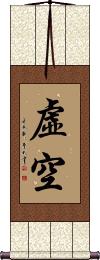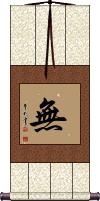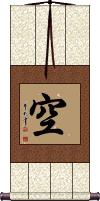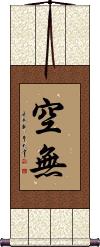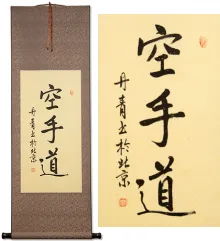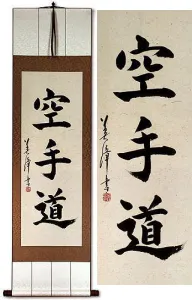Many custom options...
And formats...

Empty in Chinese / Japanese...
Buy an Empty calligraphy wall scroll here!
Personalize your custom “Empty” project by clicking the button next to your favorite “Empty” title below...
Nothingness / Empty / Void
虛空 means empty space, empty sky, or void.
In the Buddhist context, it can mean “emptiness of the material world.” This can also be used as an adjective to modify other words with a meaning of unreal or insubstantial.
Nothing / Nothingness
無 is the simple way to express “nothing.”
However, this single character leaves a bit of mystery as to what you might really mean if you hang it as a wall scroll. I'm not saying that's a bad thing; as you can decide what it means to you, and you won't be wrong if you stay within the general context.
More info: 無 is usually used as a suffix or prefix for Chinese and Japanese words (also old Korean). It can be compared to “un-” or “-less” in English. It can also mean “not to have,” no, none, not, “to lack,” or nothingness.
True Emptiness Yields Transcendent Existence
According to Soothill 眞空妙有 means:
The true void is the mysteriously existing, truly void, or immaterial, yet transcendentally existing.
眞空妙有 is the state of being nonexistent after removing all errant worldly influences. 眞空妙有 is achieved when all forms of existence are seen for their real nature.
Sky / Ether / Void / Emptiness / Unreality
(Used in Japanese version of five elements)
空 is a single character that means empty, void, hollow, vacant, vacuum, blank, nonexistent, vacuity, voidness, emptiness, non-existence, immateriality, unreality, the false or illusory nature of all existence, and being unreal.
In the Buddhist context, this relates to the doctrine that all phenomena and the ego have no reality but are composed of a certain number of skandhas or elements, which disintegrate. The void, the sky, space. The universal, the absolute, complete abstraction without relativity. The doctrine further explains that all things are compounds, or unstable organisms, possessing no self-essence, i.e. are dependent, or caused, come into existence only to perish. The underlying reality, the principle of eternal relativity, or non-infinity, i.e. śūnya, permeates all phenomena making possible their evolution.
From Sanskrit and/or Pali, this is the translation to Chinese and Japanese of the title śūnya or śūnyatā.
In Japanese, when pronounced as “ron” (sounds like “roan”) this can be a given name. It should be noted that this Kanji has about 5 different possible pronunciations in Japanese: kuu, kara, sora, ron, and uro. 空 is also an element in the Japanese version of the five elements.
Nothingness
空無 is “nothingness” in a Buddhist context.
The first character means empty but can also mean air or sky (air and sky have no form).
The second character means have not, no, none, not, or to lack.
Together these characters reinforce each other into a word that means “absolute nothingness.”
I know this is a term used in Buddhism, but I have not yet figured out the context in which it is used. I suppose it can be the fact that Buddhists believe that the world is a non-real illusion, or perhaps it's about visualizing yourself as “nothing” and therefore leaving behind your desire and worldliness.
Buddhist concepts and titles often have this element of ambiguity or, rather, “mystery.” Therefore, such ideas can have different meanings to different people, and that's okay. If you don't get it right in this lifetime, there will be plenty more lifetimes to master it (whatever “it” is, and if “it” really exists at all).
Soothill defines this as “Unreality, or immateriality, of things, which is defined as nothing existing of independent or self-contained nature.”
This in-stock artwork might be what you are looking for, and ships right away...
Gallery Price: $60.00
Your Price: $36.88
Gallery Price: $200.00
Your Price: $118.88
Gallery Price: $268.00
Your Price: $148.77
These search terms might be related to Empty:
Bare
Beautiful Clear Sky
Clear Blue Sky
Drain
Drain the Pond to Get All the Fish
Sunny / Clear and Bright
Not the results for empty that you were looking for?
Below are some entries from our dictionary that may match your empty search...
| Characters If shown, 2nd row is Simp. Chinese |
Pronunciation Romanization |
Simple Dictionary Definition |
乾 干 see styles |
gān gan1 kan ken けん |
More info & calligraphy: Qianqian (one of the trigrams of the I Ching: heaven, northwest); (surname) Nukui Dry, dried up, clean; heaven, male, masculine, enduring, continual. Translit. gan and h. |
唐 see styles |
táng tang2 t`ang tang touzaki / tozaki とうざき |
More info & calligraphy: Donn(1) (hist) Tang dynasty (of China; 618-907); T'ang dynasty; (2) (archaism) China; foreign country; (surname) Touzaki for nothing |
白 see styles |
bái bai2 pai yuki ゆき |
More info & calligraphy: White(1) white; (2) (See ボラ・1) striped mullet fry (Mugil cephalus); (3) (See 科白・1) (spoken) line (in a play, film, etc.); one's lines; (4) {mahj} white dragon tile; (5) {mahj} winning hand with a pung (or kong) of white dragon tiles; (6) (abbreviation) (rare) (See 白耳義・ベルギー) Belgium; (7) (abbreviation) (archaism) (See 白人・1) white person; Caucasian; (female given name) Yuki White, pure, clear; make clear, inform. |
空 see styles |
kòng kong4 k`ung kung kuu / ku くう |
More info & calligraphy: Sky / Ether / Void / Emptiness / Unreality(1) empty air; sky; (2) {Buddh} shunyata (the lack of an immutable intrinsic nature within any phenomenon); emptiness; (3) (abbreviation) (See 空軍) air force; (noun or adjectival noun) (4) fruitlessness; meaninglessness; (noun or adjectival noun) (5) (See 五大・1) void (one of the five elements); (can be adjective with の) (6) {math} empty (e.g. set); (female given name) Ron śūnya, empty, void, hollow, vacant, nonexistent. śūnyatā, 舜若多, vacuity, voidness, emptiness, non-existence, immateriality, perhaps spirituality, unreality, the false or illusory nature of all existence, the seeming 假 being unreal. The doctrine that all phenomena and the ego have no reality, but are composed of a certain number of skandhas or elements, which disintegrate. The void, the sky, space. The universal, the absolute, complete abstraction without relativity. There are classifications into 2, 3, 4, 6, 7, 11, 13, 16, and 18 categories. The doctrine is that all things are compounds, or unstable organisms, possessing no self-essence, i.e. are dependent, or caused, come into existence only to perish. The underlying reality, the principle of eternal relativity, or non-infinity, i.e. śūnya, permeates all phenomena making possible their evolution. From this doctrine the Yogācārya school developed the idea of the permanent reality, which is Essence of Mind, the unknowable noumenon behind all phenomena, the entity void of ideas and phenomena, neither matter nor mind, but the root of both. |
空手 see styles |
kōng shǒu kong1 shou3 k`ung shou kung shou sorate そらて |
More info & calligraphy: Karate(1) karate; (2) empty handed; (surname) Sorate |
虚空 see styles |
kokuu / koku こくう |
More info & calligraphy: Nothingness / Empty / Void |
虛心 虚心 see styles |
xū xīn xu1 xin1 hsü hsin koshin |
More info & calligraphy: Calm and Open MindWith humble mind, or heart. |
虛空 虚空 see styles |
xū kōng xu1 kong1 hsü k`ung hsü kung kokū |
More info & calligraphy: Nothingness / Empty / Voidśūnya; empty, void, space; ākāśa, in the sense of space, or the ether; gagana, the sky, atmosphere, heaven; kha, space, sky, ether, 虛 is defined as that which is without shape or substantiality, 空 as that which has no resistance. The immaterial universe behind all phenomena. |
佉 see styles |
qū qu1 ch`ü chü kya |
surname Qu Translit. kha, also khya, ga, gha, khu, khi; cf. 呿, 喀, 吃, 呵, 珂, 恪, 轗; it is used to represent 虛空 space, empty. Skt. khainter alia means "sky", "ether". |
匱 匮 see styles |
kuì kui4 k`uei kuei hitsu |
to lack; lacking; empty; exhausted deficiencies |
咕 see styles |
gū gu1 ku |
(onom.) for the sound of a bird, an empty stomach etc |
寥 see styles |
liáo liao2 liao ryou / ryo りょう |
empty; lonesome; very few (surname) Ryō |
嵺 see styles |
liáo liao2 liao |
(literary) vast and empty |
廓 see styles |
kuò kuo4 k`uo kuo kuruwa くるわ |
(bound form) extensive; vast; (bound form) outline; general shape; (bound form) to expand; to extend (1) district; quarter; (2) enclosure; area enclosed by earthwork; (3) red-light district; (pref,suf) (4) wide and empty; (surname) Kuruwa Wide, spacious, open, vacant. |
徒 see styles |
tú tu2 t`u tu toumei / tome とうめい |
(bound form) disciple; apprentice; believer; (derog.) wrongdoer (as in 騙徒|骗徒[pian4 tu2] "swindler" or 叛徒[pan4 tu2] "traitor" etc); (bound form) on foot; (bound form) bare; empty; (bound form) to no avail; in vain; (bound form) merely; just; only; (bound form) prison sentence party; set; gang; company; person; (personal name) Toumei On foot; a follower, disciple; in vain; banishment. |
控 see styles |
kòng kong4 k`ung kung |
to control; to accuse; to charge; to sue; to invert a container to empty it; (suffix) (slang) buff; enthusiast; devotee; -phile or -philia |
枵 see styles |
xiāo xiao1 hsiao |
(archaic) hollow of a tree; (literary) empty; hollow |
槺 see styles |
kāng kang1 k`ang kang |
empty space inside a building |
沖 冲 see styles |
chōng chong1 ch`ung chung fukashi ふかし |
(of water) to dash against; to mix with water; to infuse; to rinse; to flush; to develop (a film); to rise in the air; to clash; to collide with open sea; (surname) Fukashi empty |
癟 瘪 see styles |
biě bie3 pieh |
deflated; shriveled; sunken; empty |
秕 see styles |
bǐ bi3 pi shiina / shina しいな |
grain not fully grown; husks; withered grain; unripe grain (1) empty grain husk; immature ear (e.g. wheat); hollow object; (2) unripe fruit |
罄 see styles |
qìng qing4 ch`ing ching kyō |
to use up; to exhaust; empty empty |
肙 see styles |
yuān yuan1 yüan |
a small worm; to twist; to surround; empty |
荒 see styles |
huāng huang1 huang susamu すさむ |
desolate; shortage; scarce; out of practice; absurd; uncultivated; to neglect (1) leftovers (after filleting a fish); (2) rice chaff; (3) (kana only) flaw (esp. of a person); (prefix) (4) rough; roughly; (5) crude; raw; natural; wild; (given name) Susamu Wild, waste; wilds; empty; famine; reckless; to nullify; an angry appearance. |
虗 see styles |
xū xu1 hsü ko |
old variant of 虛|虚[xu1] empty |
虛 虚 see styles |
xū xu1 hsü kyo |
emptiness; void; abstract theory or guiding principles; empty or unoccupied; diffident or timid; false; humble or modest; (of health) weak; virtual; in vain śūnya. Empty, vacant; unreal, unsubstantial, untrue; space; humble; in vain. |
蛻 蜕 see styles |
tuì tui4 t`ui tui monuke もぬけ nukegara ぬけがら |
skin cast off during molting; exuvia; to pupate; to molt; to slough; to cast off an old skin or shell shed skin of snake, insect, etc. (also place left behind); cast-off skin (snake, insect, etc.); husk; empty shell; exuvia; exuviae |
一空 see styles |
yī kōng yi1 kong1 i k`ung i kung ikkuu / ikku いっくう |
leaving none left; (sold etc) out (given name) Ikkuu All is empty, or of the void, non-material. |
三假 see styles |
sān jiǎ san1 jia3 san chia sanke |
prajñāpti. The word 假 q.v. in Buddhist terminology means that everything is merely phenomenal, and consists of derived elements; nothing therefore has real existeme, but all is empty and unreal, 虛妄不實. The three 假 are 法 things, 受 sensations, and 名 names. |
三界 see styles |
sān jiè san1 jie4 san chieh mikai みかい |
(1) {Buddh} (See 欲界,色界,無色界) the three realms of existence; (2) (abbreviation) {Buddh} (See 三千大千世界) the whole universe (of a billion worlds) that Buddha enlightened; (3) {Buddh} (See 三世・さんぜ・1) past, present and future existences; (suffix) (4) far-off ...; distant ...; (surname) Mikai Trailokya or Triloka; the three realms; also 三有. It is the Buddhist metaphysical equivalent for the Brahmanic cosmological bhuvanatraya, or triple world of bhūr, bhuvaḥ, and svar, earth, atmosphere, and heaven. The Buddhist three are 欲, 色, and 無色界, i.e. world of sensuous desire, form, and formless world of pure spirit. (a) 欲界 Kāmadhātu is the realm of sensuous desire, of 婬 and 食 sex and food; it includes the six heavens of desire, the human world, and the hells. (b) 色界 Rūpadhātu is the realm of form, meaning 質礙 that which is substantial and resistant: it is above the lust-world and contains (so to speak) bodies, palaces, things, all mystic and wonderful一a semi-material conception like that in Revelation; it is represented in the 四禪天, or Brahmalokas. (c) 無色界 Arūpadhātu, or ārūpyadhātu, is the formless realm of pure spirit, where there are no bodies, places, things, at any rate none to which human terms would apply, but where the mind dwells in mystic contemplation; its extent is indefinable, but it is, conceived of in four stages, i,e. 四空處 the four "empty" regions, or regions of space in the immaterial world, which are 四無色 the four "formless" realms, or realms beyond form; being above the realm of form, their bounds cannot be defined. v. 倶舍論世間品. |
Click here for more empty results from our dictionary
The following table may be helpful for those studying Chinese or Japanese...
| Title | Characters | Romaji (Romanized Japanese) | Various forms of Romanized Chinese | |
| Nothingness Empty Void | 虛空 虚空 | kokuu / koku | xū kōng / xu1 kong1 / xu kong / xukong | hsü k`ung / hsükung / hsü kung |
| Nothing Nothingness | 無 无 | mu | wú / wu2 / wu | |
| True Emptiness Yields Transcendent Existence | 眞空妙有 | shin kuu myou u shinkuumyouu shin ku myo u | zhēn kōng miào yǒu zhen1 kong1 miao4 you3 zhen kong miao you zhenkongmiaoyou | chen k`ung miao yu chenkungmiaoyu chen kung miao yu |
| Sky Ether Void Emptiness Unreality | 空 | kuu / kara / sora / ron ku / kara / sora / ron | kōng / kong1 / kong | k`ung / kung |
| Nothingness | 空無 空无 | kuu mu / kuumu / ku mu | kōng wú / kong1 wu2 / kong wu / kongwu | k`ung wu / kungwu / kung wu |
| In some entries above you will see that characters have different versions above and below a line. In these cases, the characters above the line are Traditional Chinese, while the ones below are Simplified Chinese. | ||||
Successful Chinese Character and Japanese Kanji calligraphy searches within the last few hours...
